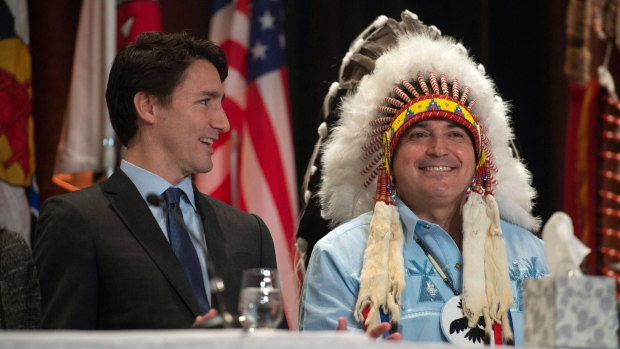When my sister and I were in high school, we thought it was funny to tell our non-Native boyfriends ridiculous things about the rez and see what they believed.
We lived on the Six Nations reserve about 25 kilometres southwest of Hamilton, but since the only high school on the rez was Mohawk immersion, and we didn't speak the language, that meant we had to catch the bus into nearby Brantford, Ont. Even though our rez was just a 20-minute drive away, very few of the non-Native kids we went to high school with had ever been there – the exception, of course, being those whose parents considered cheap cigarettes and gas worth the trek. In other words, most of these kids knew nothing about the rez, or us.
One day, my sister, Missy, was talking to her white boyfriend online. When he asked if she could come over, Missy fired back with, "Sorry, can't. The gates to the rez close at night. :(" When he responded, "That sucks. Maybe tomorrow?", we were incredulous. How could he be so gullible? We laughed and laughed.
I've been thinking a lot about our laughter lately.
I remember thinking that her white boyfriend was so ignorant, but we didn't know about the Pass System, which was in effect for 60 years in Canada, and required Native people living on the reserve to get permission from a Canadian Indian Agent to leave. Who needs literal gates when you have racist bureaucracy and the Indian Act?
What my sister and I didn't consider back then – what we perhaps couldn't consider – was how readily her boyfriend accepted this lie when it was applied to Native people. If she had said the same thing about a non-Native town, he probably wouldn't have believed it. But something about the way this young man was socialized – even though he grew up right next to a rez, even though he interacted with Native people – made him accept that injustice against our people was normal: that there would be gates to get into the rez, that those gates would close and that, like zoo animals, we would be trapped there until daylight when our keepers let us out. That we would be subjected to whatever form of control or governance Canada chose to impose on us, and that our opinions and consent were not required to do so.
Perhaps, on that last point, he wasn't so ignorant after all.
Canada has never accepted Indigenous peoples' right to self-determination. In fact, they – the individuals who, throughout history, have represented and made decisions on behalf of Canada – have actively suppressed it. By intentionally cutting essential funding at critical moments, wielding court injunctions to stop our land defenders and legislating the minutiae of our lives through the Indian Act, to name just a few examples, the Canadian government continually prevents us from creating meaningful change in our communities. It stops us from determining our own present and forging our own future. And like every decision Canada makes about us, without us, we're supposed to smile and accept these arrangements, or laugh defensively, or, better yet, do nothing – regardless of how it affects our families and our lives.
This is a story of how one decision illustrates the centuries-long relationship between a country's government and the Indigenous people of that land. It is a story of a name change and the breaking-up of a government department, but it represents the breaking of a promise, too. It is a story that illustrates how a government that only acknowledges colonial ways of governing cannot ever hope to create anything else. It is a story whose narrative affects every Indigenous community, including my own, the Six Nations of the Grand River. It is a story of denial, and of consent, two topics that are in the news these days for reasons that are, in some ways, not that different. It is a story whose ending has not yet been written, but one whose ending I fear will not be any more satisfactory than any story Canada has told about us.
This is our democracy. This is our reconciliation. What a way to start a new "nation-to-nation" relationship.
The name game
In August, 2017, Prime Minister Justin Trudeau surprised almost everyone by announcing that the Department of Indigenous and Northern Affairs Canada (INAC) was not only being dismantled, but was to be replaced with two new departments: Crown-Indigenous Relations and Northern Affairs, and Indigenous Services. As the days passed, it became clear that among those surprised by the news were national Indigenous organizations such as the Assembly of First Nations and the National Women's Association of Canada, elected band councils (who need INAC to approve everything they do before they can actually do it), traditional councils (who have yet to be acknowledged by Canada), even members of Health Canada and other departments whose funding and organizational makeup will be directly affected.
> Lire la suite sur le Globe&Mail.
















